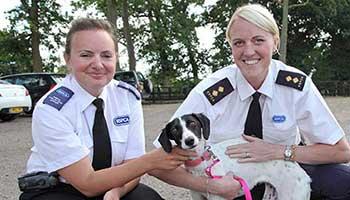Pedigree breeder given five year cat ban for neglecting 11 Persians - RSPCA
Pedigree breeder given five year cat ban for neglecting 11 Persians
11.06.24
A woman from North Shields who advertised pedigree cats on Facebook failed to get veterinary treatment for 11 underweight Persians who were all suffering from a catalogue of health problems, a court has heard.
Stephanie Neesam, who used the name ‘Purrcise Persians,' on the social media platform, left the cats to suffer in a dirty environment for a minimum of two months, said a vet.
The case has led the RSPCA to reiterate its warning to anyone thinking about buying a pedigree cat to choose a responsible breeder carefully.
At a hearing at Newcastle Magistrates Court on 23 May, Neesam was banned from keeping cats for five years following an investigation and prosecution by the animal welfare charity after pleading guilty to one charge contrary to the Animal Welfare Act 2006.
The court heard how RSPCA Inspector Helen Bestwick had gone to the house in July 2023 at the request of the police and found the cats living in a dirty room at the rear of the property.
In a written statement to the court the inspector said: “The room smelt strongly of ammonia and was unfurnished apart from an armchair covered with dirty blankets. There were two litter trays dirty with faeces and a further automatic litter tray which Miss Neesam stated the cats didn’t use.
“There was one dish for water which was nearly empty and I noticed the cats kept coming over to the bowl. There was also an empty plastic tower feeder. The tiled floor was dirty and there was some faeces on it.”
Neesam was advised by the inspector that she suspected the cats were suffering or were likely to suffer if their circumstances didn’t change and they would need to be examined by a vet.
They were seized from the address by the police and taken for treatment. The vet who examined them confirmed they were suffering and they were then taken into police possession before being passed into the care of the RSPCA.
In written evidence to the court the vet described the cats as thin and all but one of the animals was given a body score condition of 3/9. They were all displaying symptoms of cat flu and the vet noted a range of other health issues including:
- Flea dirt
- Poor muscling
- Wheezing
- Green discharge coming from the nostrils
- Watery discharge and thick black crusting around the eyes
- Dirty ears
- Poor teeth with tartar build up
- Untreated respiratory infections in the male cats
The cats were dematted and bathed by veterinary staff and given topical antibiotics for their eye infections as well as flea and worming medication.
One of the group, a four-year-old male called Claws, was suffering from an eye condition that would affect his quality of life in the future as he was unable to see normally, the court was told.
In her written evidence as part of the case the vet said: “All 11 cats were presented to me in very poor condition. They were all underweight, poorly muscled, extremely dirty and matted. In fact cats are usually meticulous about their hygiene. Their dirty environment made this impossible to achieve. In addition to causing hygiene issues detrimental to their health it is a source of distress to cats not being able to remain clean.
“They were not protected from disease and suffering and were all poorly, showing moderate to severe symptoms of cat flu which is a disease that can be vaccinated against. The overcrowding and poor hygiene with lack of isolation facilities allowed this condition to spread contagiously affecting all of the cats to some extent.
“The intact males should not have been housed with the intact females. This allows repeated matings, competition and aggression, inbreeding and additional cats to care for.
“Of the five needs necessary for animals to live a comfortable life, not one of them was being met properly.”
The vet concluded that the cats' suffering was avoidable had a vaccination programme, veterinary healthcare, hygiene measures and suitable housing been provided by Neesam. She said the duration of suffering was a minimum of two months but quite probably longer for at least some of the cats.
Neesam, who didn’t provide any pedigree paperwork for the cats, was interviewed about what had happened.
She told the RSPCA that she used to breed Persians but had stopped the previous year, despite a Facebook post from May 2003 showing pictures of an 18-month old ginger cat called Harvey who she described as her “new stud for next year”. The same cat was found in her house two months later with laboured breathing, a matted coat, faeces and urine stained feet and infected eyes.
Neesam said she didn’t agree that the cats were underweight as they were “fed freely.” She admitted she was struggling with numbers and had only wanted to keep four or five, but hadn’t contacted any animal welfare charities for help.
Seven of the 11 cats were signed over by her during the course of the RSPCA’s investigation. They all recovered well at the charity’s Felledge Animal Centre near Chester-le-Street where they were cared for and then rehomed.
Neesam, who was also given an 18 month community order with 15 RAR days, has since appealed the deprivation order imposed by the court preventing her from having the remaining four cats back.
Speaking after the case had concluded Inspector Bestwick, who thanked the police for their assistance with the case, said: “The owner openly admitted she was aware of the cats’ problems but despite this she failed to provide a suitable environment, get them routinely vaccinated or seek appropriate veterinary treatment for their numerous health issues as any responsible owner would do.
“It took many months of care and rehabilitation by our staff at Felledge to get these cats right again, but thankfully the seven that were signed over to us have found lovely new homes and have a much happier future ahead of them.
“Of course we would always encourage anyone thinking of welcoming a cat into their family to consider rescuing one as there are hundreds of beautiful cats waiting to be adopted in animal centres up and down the country.
“For people who still have their heart set on a pedigree cat we would urge them to do their homework and choose a breeder carefully to ensure they are getting a happy, healthy pet and not supporting people who put profit before welfare.”
To help the RSPCA continue rescuing, rehabilitating, releasing and rehoming animals in desperate need of care please donate online or call our donation line on 0300 123 8181.


